A Matter of Opinion, Part 2
Starting to teach is a scary proposition. We may see it as a help to label everything and everyone. That puts order into things and makes us feel a little better about our terrifying responsibility towards our charges. The problem is that while it may seem helpful to quantify everything and everyone to give ourselves a feeling of control over the situation, it isn’t doing our students much good.*
So, is there teaching without opinions? Of course there is!
First, in order to understand your students’ point of view a little better, ask yourself a few questions:
- Do you like it when you perceive someone has formed an opinion of you? Even a flattering one which can be hard to live up to?
- Do you like the feeling of having been categorized?
- How did you feel or react if a teacher did this to you and you felt you had no chance to change her mind?
But how, you might ask, can I teach if I don’t know what I am dealing with? The truth is you NEVER know what you are dealing with. This is what makes teaching exciting. Every student is a new adventure every time you see him. So accept and enjoy it. Wise teachers know this and feel comfortable with it. And those who don’t know this make everyone’s life miserable, including their own, as they cannot teach as well as they would like to.
So here’s what happens when you base your relationship with your students on opinions:
- The student plays something badly with, say, little sound or musicality.
- You hear this and come to the conclusion that the student has no talent, is timid, or whatever negative quality you would like to assign him.
- Your student perceives this (they all do) and gives up on himself, gets discouraged, receiving confirmation of his own worst fears.
- The student is unhappy and certainly does not improve much.
The teacher may be unhappy, too, but unfortunately there are teachers who use their opinions of their students in order to abdicate their responsibility – if the student IS that way, then there is nothing that can be done about it. End of story. Next, please.
I doubt that anyone who is reading this is so inclined, so here is teaching without opinions:
- Your student plays something badly,
- You hear what he is doing and do something about it.
No intermediate steps, no judgments, no recriminations, no wondering about your student’s DNA. Just go straight to solving the problem that is manifested by what the student DOES, not by what he IS. The advantages to this are many:
- You have saved lots of mental and emotional energy that you can now apply to solving the problem at hand.
- You are now in direct contact with your student and he is going to love it.
- You are now FREE. No more opinions, ideologies, didactics – you are dealing with what your student does and not what you or anyone else may think about him. This means you are free to break the rules if you deem it necessary (and it sometimes is – remember you are dealing with human beings, not the laws of physics).
I have come to the conclusion over the years that what a child (or any human being, myself included) really wants is to be seen for what he is in that moment and not what you think he is or what you want him to become. You can’t do this if you allow yourself to get caught up in categories, theories, ideas, opinions. The only way is to watch, observe, listen to, see, and hear what a student DOES without drawing any further conclusions as to his character, defects, faults, etc. Then everything becomes simple and easy. You let go of your life preserver of opinion and learn to swim. It can be scary not to have anything to hang onto, but freedom and independence are always scary, especially at first, but the alternative is totally unacceptable – imprisoning yourself and your student in the straitjacket of opinion.
* See “A Matter of Opinion,” Part 1.
Share this:
Buy it on www.sharmusic.com - eBook format, avaliable worldwide, paperback in North America
COPYRIGHT
ABOUT
A music teacher’s thoughts and observations on the teaching and the study of a musical instrument, hoping to be of help to parents, students and teachers.
PHOTO
AWARDED TOP 25 VIOLIN BLOG
CATEGORIES
TAGS
ARCHIVES
-
Agosto 2022
Agosto 2023
Agosto 2024
April 2015
April 2016
April 2017
April 2019
April 2020
Aprile 2022
Aprile 2023
Aprile 2024
August 2014
August 2015
August 2016
August 2017
August 2018
August 2019
August 2021
December 2014
December 2015
December 2016
December 2017
December 2018
December 2019
December 2020
Dicembre 2022
Dicembre 2023
Dicembre 2024
Febbraio 2022
Febbraio 2023
Febbraio 2024
February 2015
February 2016
February 2018
February 2019
February 2020
February 2021
Gennaio 2022
Gennaio 2023
Gennaio 2024
Giugno 2022
Giugno 2022
Giugno 2023
Giugno 2024
January 2015
January 2016
January 2017
January 2018
January 2019
January 2020
July 2015
July 2017
July 2019
June 2016
June 2017
June 2018
June 2019
June 2020
June 2021
Luglio 2022
Luglio 2023
Luglio 2024
Maggio 2022
Maggio 2023
Maggio 2024
March 2015
March 2016
March 2017
March 2018
March 2019
March 2020
March 2021
Marzo 2022
Marzo 2023
Marzo 2024
May 2015
May 2016
May 2018
May 2019
May 2020
November 2014
November 2015
November 2016
November 2017
November 2018
November 2019
November 2021
Novembre 2022
Novembre 2023
Novembre 2024
October 2014
October 2015
October 2017
October 2018
October 2019
October 2020
October 2021
Ottobre 2022
Ottobre 2023
Ottobre 2024
September 2014
September 2015
September 2016
September 2018
September 2019
September 2020
September 2021
Settembre 2022
Settembre 2023
Settembre 2024
RECENT POSTS
Terry G and Me, or Terry Gilliam on Where (or What) Practicing the Piano Will Get You…
The Teaching We Don’t Do Is More Important Than We Think
Overwhelmingness or What Teaching and Motherhood* Have in Common
Cellphone Serenity
How to Build Your Reputation – the Kind You Want
Desperate Times, Desperate Measures. Or How to Deal With Your Strong-Willed Stubborn Student and Survive
“Why Does My Teacher Get So Frustrated?” Letter to a Perplexed Student
Mount Rush-no-more….And How to Get There
Realizzato con VelociBuilder - Another Project By: Marketing:Start! - Privacy Policy




